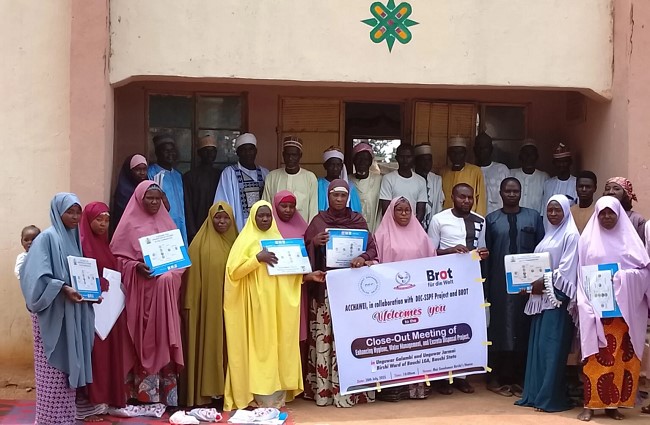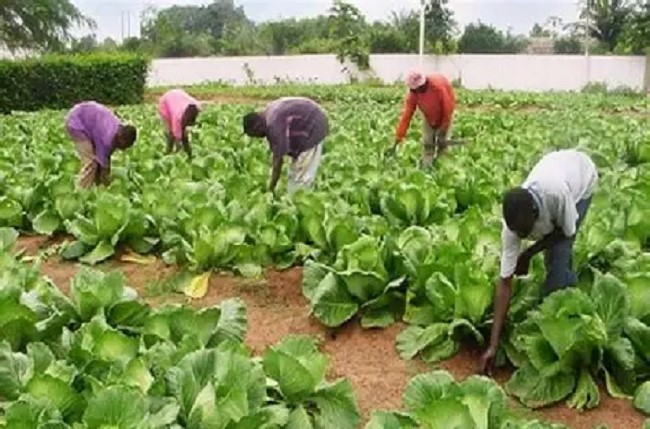Agricultural systems across the world are under increasing pressure to meet growing food demands. This pressure is high in Nigeria due to purportedly high population indices, coupled with climate change impacts, declining soil fertility, inadequate support for farmers and insecurity.

As the nation grapples with these challenges, it must ensure that whatever actions taken are such that address the core barriers to food productivity, and that ensure environmental sustain-ability, public health, and economic resilience for smallholder farmers.
Agroecology presents viable solutions to these interconnected challenges by emphasising ecological balance, biodiversity, farmer empowerment, and food sovereignty. The shift toward agroecology and organic agriculture is gaining momentum in Nigeria with the active support of civil society, public institutions, and farmer-led initiatives. However, there is need for cohesiveness of efforts to ensure not only the adoption of agroecological practices but also an enabling policy environment as well as relevant research.
The National Stakeholders’ Conference on Agroecology held on July 21, 2025, brought together key actors in the agroecology and organic agriculture space including farmers, researchers, civil society organisations, youth and women’s groups, policy advocates and the media for a full day of dialogue, knowledge exchange, and strategic planning. The conference also featured a reportage on the progress of Agroecology and Organic Agriculture in Nigeria.
The conference was themed: “Advancing Agroecology Principles and Practice for Food Sovereignty in Nigeria.”
Specifically, the conference showcased and discussed the current state of agroecology and organic agriculture in Nigeria; fostered collaboration among farmers, civil society organizations (CSOs), government ministries, academia, and the media; identified policy gaps and opportunities to scale agroecological and organic practices and exposed false solutions to the food and climate challenges.
Observations
During dialogue at the conference, the following observations were made:
- Agroecological practices can increase food sovereignty- which, beyond food security protects and promotes the right of choice and control by local communities and people of their seeds and foods.
- Agroecology assures healthy and culturally appropriate nutrition, increased crop diversity, improved soil health by enhancing and improving soil microbial populations, climate change mitigation through reduced emissions from industrial processes, climate change resilience through biological diversity and empowerment of local communities.
- Success stories abound on how agroecology can transform food systems e.g the introduction of drought-resistant orange-fleshed sweet potatoes in Pelungu, Ghana, improved food security and nutrition in a dryland farming area. In Kenya, the Participatory Ecological LandUse Management (PELUM) Network promoted African leafy vegetables, reviving traditional agricultural practices and organic farming techniques. This led to improved livelihoods, increased crop production, and stronger community-based enterprise. In Malawi, the “NeverEndingFood” initiative uses permaculture-based agroecology to combat food insecurity. By diversifying food production and improving nutrition, it has created year-round food sources for communities, transforming degraded land into productive farms.
- In Nigeria, the Be the Help Foundation Agroeforestry farm effectively demonstrates how agroecology through agroforestry can assure economic empowerment for farmers as well as environmental sustain-ability.
- Barriers to agroecology and by extension, food sovereignty include limited knowledge, poor access to land (including land grabs) and credit for farmers, poor extension service, and dependence on toxic/synthetic agrochemicals.
- Another major barrier to food sovereignty in Nigeria is the spread of GMOs, which creates dependency on multinational corporations for seeds and food production. GMOs also lead to soil degradation through the use of toxic herbicides.
- The goal shouldn’t be merely to achieve food security but food sovereignty where healthy food is guanranteed, and the local people are in control of their seed and food systems. Food sovereignty must take precedence over mere food security.
- Food security cannot be achieved without local control over food systems, seeds and agricultural processes (food sovereignty). But this can only be achieved by creating policies that protect farmers’ rights and agricultural autonomy.
Declarations
Participants therefore declared their commitment to:
- Champion the adoption of agroecological practices across Nigeria’s farming communities.
- Prioritise food sovereignty over food security in policy discussions and implementation.
- Advocate for research and development in agroecological methods suited for the Nigerian context, and strengthen both academic and farmer-led research initiatives.
- Ensure farmers’ rights to seeds, land, water and other resources as well as a preservation of their traditional seed varieties.
- Address the critical knowledge gap regarding agroecology’s importance for our national development.
- Promote local food systems that preserve indigenous knowledge and cultural food practices.
- Push for government investment in agroecological research and extension services
- Create improved communication channels and knowledge-sharing practices among farmers, communities, researchers, and policymakers to enhance the visibility and effectiveness of agroecological methods.
- Follow up with the Federal Ministry of Agriculture and Food Security on the plan to mainstream agroecology into national policies following the inclusion in Nigeria’s NDC 3.0.
Call to Action
At the end of the stakeholders’ conference on agroecology, the participants call on:
- Government at all levels to recognise agroecology as essential for national food sovereignty and agricultural sustainability, and to create a supportive policy framework.
- Nigerian citizens to embrace subsistence farming in their homes, support local food systems, and advocate for a healthy food policy.
- Government at all levels to ban GMOs and promote/invest in agroecology research and practice for increased food productivity.
- All stakeholders to promote structured youth training programmes in agroecology to ensure the intergenerational transfer of indigenous knowledge and sustain Nigeria’s cultural food systems.
- Academic institutions to integrate agroecology into school curricula and prioritise it within research institutes to deepen knowledge and innovation in sustainable agriculture.
- Government to enact policies to create and promote national seed banks that preserve indigenous seeds and protect farmers’ sovereignty.
- Government and relevant authorities to address growing insecurity and lack of access to land for farmers, particularly women and youth, by ensuring secure, equitable land tenure systems and protection for farming communities.
- Ministry of Agriculture and Food Security to develop and implement a comprehensive national standard for organic and agroecological practices, ensuring quality, safety, and sustainability in production systems.
- Government to train and deploy extension workers with specialised knowledge in agroecology to support farmers in adopting sustainable, climate-resilient practices.
- Government to create an enabling environment for marketing and promotion of agroecological produce and product.











